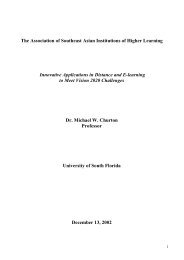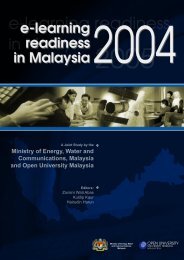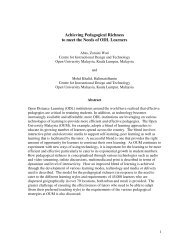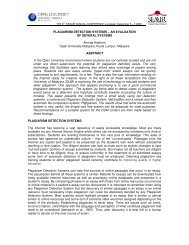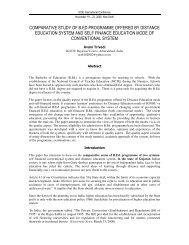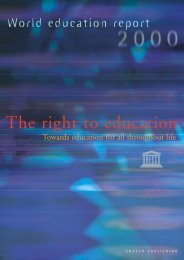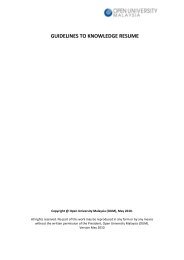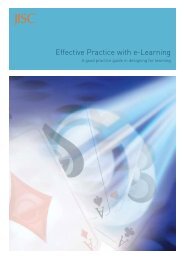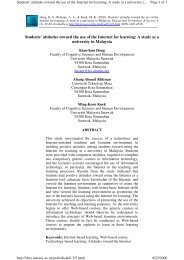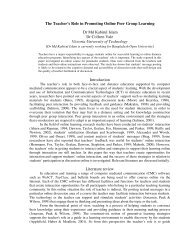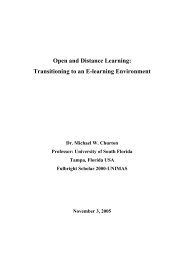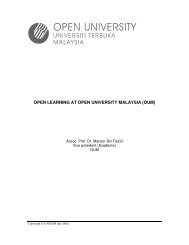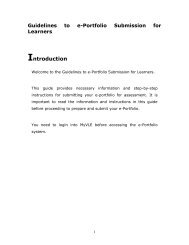lifelong learning and distance higher education - Asia Pacific Region
lifelong learning and distance higher education - Asia Pacific Region
lifelong learning and distance higher education - Asia Pacific Region
- No tags were found...
You also want an ePaper? Increase the reach of your titles
YUMPU automatically turns print PDFs into web optimized ePapers that Google loves.
of all possible credentials across borders be possible. Portfolio development can form avaluable addition to international credential evaluation to identify <strong>and</strong> document all formsof <strong>learning</strong>. Additionally, more objective test instruments should be developed to assesscompetencies further. Nuffic will continue to work on the development of instruments forthe assessment of prior <strong>learning</strong> of immigrants. In this process, it will continuously takenote of developments at European <strong>and</strong> international levels <strong>and</strong>, where possible, link upwith instruments developed internationally.POLICY CONSIDERATIONSThe policy issues that can be drawn from the above are summarised below:• Make sure that reliable <strong>and</strong> transparent information about the national qualityassurance <strong>and</strong> accreditation system is easily available for potential students,international credential evaluators working at national information centres or at<strong>education</strong>al institutions <strong>and</strong> employers.Whether a diploma, degree or qualification will be officially recognised in anothercountry depends to a large extent on the quality of the study programme <strong>and</strong> theinstitution providing it. Students intending to study abroad should therefore firstmake enquiries about the quality of their proposed programme <strong>and</strong> institution <strong>and</strong>about the recognition that their diploma will have on return to their home country.Similarly, people <strong>and</strong> organisations involved in the evaluation of diplomas awardedin other countries — admissions officers at <strong>education</strong>al institutions, employershiring holders of foreign credentials <strong>and</strong> credential evaluators at recognisingorganisations — need to know if <strong>and</strong> how the basic quality of a specific programmehas been assured. This sort of information is not always readily available, but evenwhen it is, it may not be intended for an overseas readership. With this in mind,Nuffic in the role as Netherl<strong>and</strong>s NARIC / ENIC <strong>and</strong> the Netherl<strong>and</strong>s FlemishAccreditation Organisation (NVAO) took the initiative to develop a Web site foroverseas readers that contains all the information they need on quality assurance<strong>and</strong> accreditation in the Netherl<strong>and</strong>s. This initiative is being supported by the ENIC<strong>and</strong> NARIC networks <strong>and</strong> the European Network for Quality Assurance in HigherEducation (ENQA).• Providers of <strong>distance</strong> e-<strong>learning</strong> should try to gain access to national (orinternational) quality assurance <strong>and</strong> accreditation systemsIt is advised that providers of <strong>distance</strong> e-<strong>learning</strong> follow the providers in thetraditional <strong>distance</strong> <strong>education</strong> sector. However, they may be confronted with criteria<strong>and</strong> st<strong>and</strong>ards that do not apply to their specific type of <strong>education</strong>. An alternativewould be that e-<strong>learning</strong> providers jointly define st<strong>and</strong>ards <strong>and</strong> criteria. In a laterstage these st<strong>and</strong>ards can be integrated in national (or international) quality assurancesystems.• Make sure that reliable <strong>and</strong> transparent information about the aim, structure <strong>and</strong>content of the study programme is available by issuing a Diploma Supplement.The Bologna process has contributed to putting recognition issues at the centrestage of the <strong>higher</strong> <strong>education</strong> policy debate in Europe. The automatic issue of theDiploma Supplement free of charge in a widely spoken European language by 2005is one of the key policy measures of this process. Institutions offering virtual studyprogrammes or courses must make sure that they issue reliable <strong>and</strong> transparentinformation on the aim, structure <strong>and</strong> content of the programme or course.130



